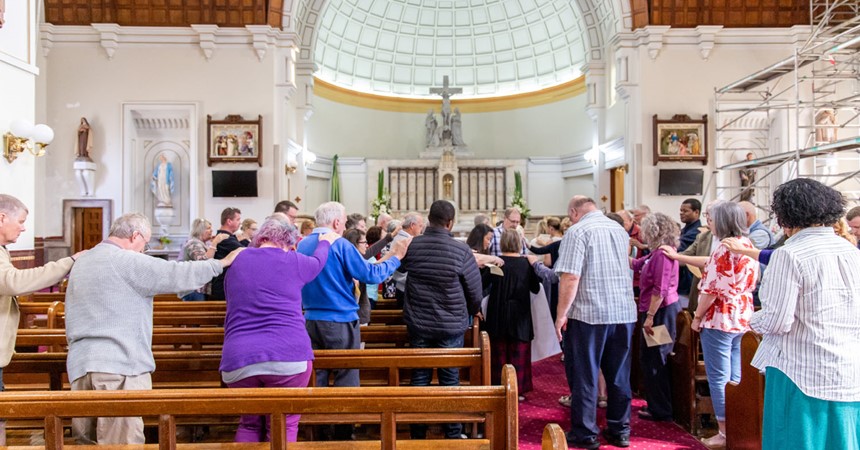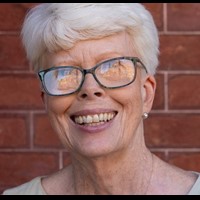This longing has been heard for many years. It has taken a new focus with COVID-19. With shut churches and limited numbers, we have come face to face with the importance of prayer and worship in the ‘domestic church’ – in our homes and in our circles of family, friends, communities, ministry groups and other gathering of people seeking to nurture their relationship with God. What we hear in the Synod Paper resonates with the voice of the people heard in the liturgy survey that the Diocesan Liturgy Council (DLC) undertook last year in partnership with National Church Life Survey (NCLS).
Our experience has revealed to us the importance of BOTH the prayer and worship of the domestic church AND the more formal public worship of the church when it gathers, particularly on Sunday, to celebrate Eucharist. Each nurtures the other.
Many do have a rich personal and communal prayer life in addition to the celebration of the public liturgy, most commonly eucharist. That’s great. However, we are hearing the voice of others who are longing for more diverse opportunities for prayer that nurture their relationship with God. These longings suggest that some don’t have the personal resources or communal networks to find what they are longing for.
I was particularly moved by the longing for parishes and communities to become ‘centres of prayer’. What a blessing such a longing is, not only for those individuals, but for the community. What a blessing it is to hear people longing for opportunities for faith sharing within the context of less formal or structured prayer.
An important aspect of reflecting on the diocesan Synod Paper to find meaning and direction, is to identify the gaps, the important things that are missing. One of the glaring gaps is scripture, particularly though not exclusively, regarding prayer and worship. Interestingly, scripture in general, and more particularly the importance of the Word of God in prayer and liturgy, was a significant theme in the responses to the 2020 liturgy survey mentioned above. One of the blessings of our COVID experience people identified was a rediscovery of praying with scripture and a desire for more.
And so, the question for all of us, not only the DLC and its various subgroups, is how do we respond? How do we open up the deep and wide treasury of Catholic prayer and liturgy that belongs to all of us?
As hinted at above, any response needs to be mindful of our changed context. ‘The times they are a-changing’ as the song says. We can no longer presume that people discover our many forms of prayer and worship by osmosis, by just hanging around the Catholic community. The longings we hear in the Synod Paper bear this out. They point to the need for more intentional responses that empower individuals and communities and don’t promote a sense of dependence often heard echoing in Synod Paper phrases such as ‘that the diocese provide.’
The DLC has only begun the journey of listening to the diocesan Synod Paper and other important data including the 2020 Liturgy Survey report from NCLS. As a very initial response to the longings we have heard, we offer the following invitations for the consideration of individuals and communities. The most significant ones focus on praying with scripture.
Essentially, these are invitations to experience a few different ways of praying with scripture. In each case we will pray and then reflect on the experience of prayer. These are not invitations to commit to a new group. Rather, we hope these experiences will be like dropping pebbles in a pond. We hope they will help anyone who participates to develop her/his personal prayer life AND perhaps, when confident, invite others to join them to pray. And so, the ripples will hopefully spread through the community as people invite others into new circles of prayer and worship that also facilitate faith sharing. In this way we all help our parishes and communities to become centres of prayer.
Please complete this form if you are interested in joining with others for an experience of
- Lectio Divina – an ancient way of praying with scripture.
- Mystagogical Reflection – an ancient way of focusing on our experience of Christ and then reflecting on the meaning of that experience personally and for the Church, its connection with life, and its call to a change of heart. We will begin by reflecting on Christ’s presence in the Sunday Gospel.
- The Examen Prayer – an ancient prayer used to review the day.
- The Prayer of the Church – morning and/or evening prayer. Also known as the Liturgy of the Hours.
- Christian Meditation.
All we are inviting you to do now is express interest by the end of Sunday 22 August. We will shape a response according to the need. We are hopeful that the expressions of ‘longing’ heard through the Synod and Plenary Council process, and the 2020 Liturgy Survey will translate into expressions of interest.
We are starting small, planting mustard seeds. Let’s see how the domestic church grows.
For further context you might like to read the previous Liturgy Matters, Unity in Diversity.
Acknowledgements
Image: © 2019 Catholic Diocese of Maitland-Newcastle.

